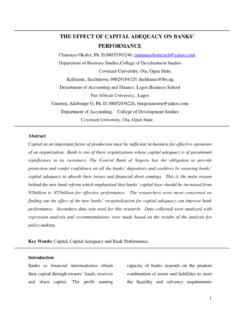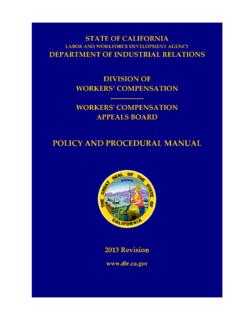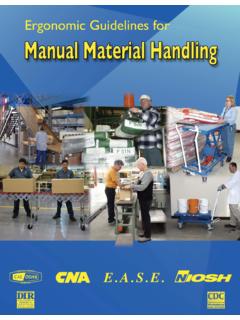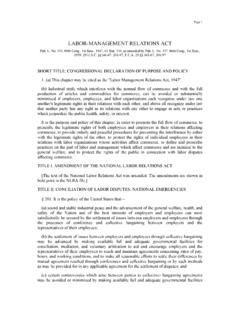Transcription of INDUSTRIAL DISPUTE PREVENTION: A CASE …
1 INDUSTRIAL DISPUTE prevention : a case STUDY OF ONGC LTD. Abstract: The study of INDUSTRIAL DISPUTE prevention involves the study of determining the types of disputes and their causes along with the settlement and prevention of disputes . What is the mangement attitude towards labour. A comparative analysis of strikes and lock out till 2006. Finally study gives the suggestions and conclusion about how to prevent the INDUSTRIAL DISPUTE . The data for such study have been collected through various primary and secondary sources(mentioned in the references).At last the study talks about the case Incident of ONGC Ltd. causes of INDUSTRIAL DISPUTE , settlement of DISPUTE , and the consequences of DISPUTE to the country. Therefore there is an urgent need to recognise, reorient and restructure the settlement machinery to cope with the present day needs.
2 Keywords: INDUSTRIAL DISPUTE prevention , Management Attitude to labour, Settlement of DISPUTE Introduction The problem of INDUSTRIAL DISPUTE is common to almost all the developed and developing countries of the world. The development of capitalistic industry which means the control of the tools of productions by small entrepreneurs class has brought to the fore the acute problem of friction between management and labour throughout the world (Bhagoliwal .1976; 187-188). Industrialization has tended to create a hiatus between management /employers and workers, owing to the absence of workers ownership over means of production (Bhangoo, 1995; 130) this gap has led to INDUSTRIAL friction and conflicts, which ultimately cause INDUSTRIAL DISPUTE . A review of the existing literature suggests that employees in unionized workplace have significantly more voice mechanisms present than in non-unionized workplace.
3 In India, trade unions have played the role of an agent of social and economic changes, protecting and enhancing the interest of its members and trying to squeeze more and more out of management through bargaining or conflict. disputes and their resolutions has been a subject of intensive research for several decades now. While some scholars consider DISPUTE as destructive, others consider as opportunities to create awareness about problems and improve internal (1993) perhaps brings out the dichotomy succinctly when he suggests that agreement is not necessarily good but neither is disagreement especially when people disagree for the sake of disagreeing, as a way to assert themselves and to avoid feeling dominated. In the Indian context disputes under the INDUSTRIAL DISPUTE Act, 1947, a DISPUTE is raised when an employment contract is not carried out.
4 The issues could include wage demands, union rivalry, political interference, unfair labour practices as described in the fifth schedule of the ID act, multiplicity of labour laws, INDUSTRIAL sickles etc. The DISPUTE resolution framework under the ID. Act consists of Conciliation, Arbitration and adjudication. Apart from this, in line with the theories of INDUSTRIAL jurisprudence, in the unionized context there is collective bargaining, establishment of work committee, discipline management and grievance resolution procedures, which help prevent DISPUTE in the first place. The first step in the resolution of DISPUTE is their discovery and exposure. There are many upward communications that can be developed for the purpose of bringing dissatisfaction to the surface. Grievance procedure is perhaps the most significant means of discovering and resolving employee complaints and dissatisfactions.
5 On the other hand, there is distinct possibility that the organization will become dissatisfied with the particular employee. Though the Skinner approach to operant conditioning of behaviour would preclude the use of punishment, typical practice of most organizations include programs of negative disciplinary action ending up with the maximum penalty of discharge from the organizations.(Flippo) .Powers has been concentrated in the hands of a few entrepreneurs, while a majority has been relegated to the insignificant position of mere wage-earners. The workers have now come to realize that most of their demands can be satisfied if they resort to concerted and collective action; while the employees are aware of the fact that they can resist these demands. This denial or refusal to meet their genuine demands has often led to dissatisfaction on the part of the workers, to their distress, and even to violent activities on their part, which has hindered production and harmed both the workers and the employees Objectives of the study This study attempts to examine some vital dimensions of the INDUSTRIAL disputes in ONGC.
6 Present study has been undertaken with a view that only a few studies on the subject have been conducted. The study has wider coverage and is a pioneer study on some important issues of INDUSTRIAL disputes . It attempts to analyze the issues in the changing economic scenario in the era of INDUSTRIAL deceleration, political turnmoil, militancy, global crisis, liberalization, globalization and privatization. Some addressed issues in the study are as follows: 1. To examine the types of disputes in India 2. Dominating causes of INDUSTRIAL disputes . 3. To analyze the INDUSTRIAL DISPUTE and settlement and prevention of the disputes from various dimensions 4. To study the management attitude towards labour 5. Comparative analysis of strikes and lock out during the period(1985-2004). 6.
7 Offering suggestions and implications for improvement. Types of INDUSTRIAL disputes INDUSTRIAL DISPUTE may take the form of strikes, go-slow tactics, token strikes, and sympathetic strikes, pen down strike, hunger strike, and bandhs gheraos and lock out. A strike is a stoppage of work, initiated or supported by a trade union, when a group of employees act together as a last resort to bring pressure to bear on an employer to resolve a grievance or constrain him to accept such terms and conditions of services as the employees want to enjoy. If however, an employer closes down his factory or place where his workers are employed, or if he refuses to continue in his employ a person or persons because he wants to force them to agree to his terms and conditions of services during the pendency of a DISPUTE .
8 The resulting situation is a lock out.(C B. Mamoria). disputes according to the code of INDUSTRIAL relations introduced in the United Kingdom in 1972. are of two kinds ( , Conciliation of INDUSTRIAL DISPUTE , All India Management Association), first Indian edition . 1980, pp 13-14. a) disputes of rights, which relate to the application or interpretation of an existing agreement or contract of employment; and b) disputes of Interest, which relate to the claims by employee or proposals by a management about the terms and conditions of the employment. According to the INDUSTRIAL DISPUTE Act 1947, and many judicial decisions which have been handed over by courts and tribunals, INDUSTRIAL disputes may be raised on any one of the following issues: Fairness of the standing orders;. Retrenchment of workers following the closing down of a factory, lay-offs.
9 Discharge or dismissal, reinstatement of dismissed employees, and the compensation for them;. Benefits of an Award denied to a worker; non payment of personal allowance to seasonal employees; the demands of employees for medical relief for their parents;. Wages, fixation wages and minimum rates, mode of payment, and the right of an employee to choose one of the awards when two awards on wages have been given;. Lock-out and claim for damages by an employer because employees resorted to an illegal strike;. Payment of hours, gratuity, provident fund , pension and traveling allowance;. disputes between rival union; and disputes between employers and employees Paradoxes of INDUSTRIAL DISPUTE Distributive Process Western Societies Traditional Societies Court System Cultural Paradox DISPUTE Resolved Litigation Replaces Through litigation Meditation (A) (D).
10 Cultural Paradox Village Council Consensual Adversanare Predisposition Predisposition Meditation Provide DISPUTE Resolved Alternative to litigation Through Meditation (CADR) (ODR). (B) (C). Integrative Process INDUSTRIAL DISPUTE Weapons of Weapons of labour Management Strike Boycott Picketing Gherao Employers Lock Out Termination Association of Service Primary Secondary Economics General Stay-in Slow down INDUSTRIAL disputes IN INDIA DURING THE YEAR 2004. Causes of INDUSTRIAL DISPUTE The disputes between the management and the workers may arise on account of the following factors: 1. Economic Cause: These causes may be classified as: o Demand for increase in wages on account of increase in all-India Consumer Price Index for INDUSTRIAL Workers. o Demand for higher gratuity and other retirement benefits.











